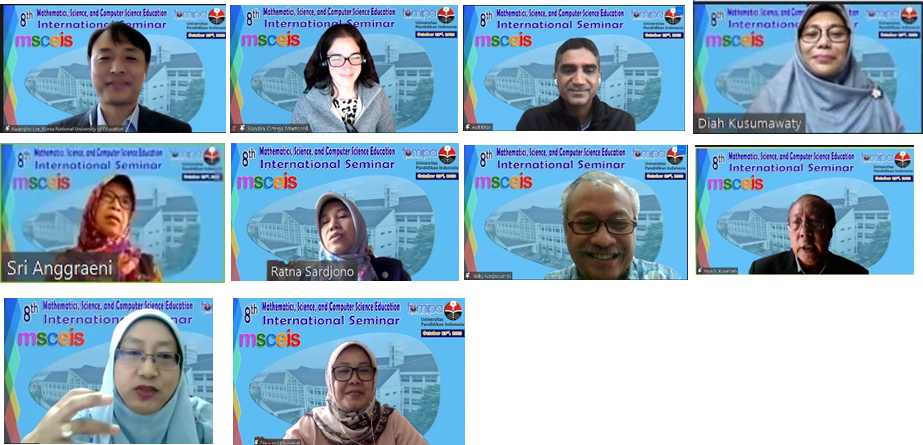Saturday, 23 October 2021

On Saturday, 23 October 2021, FPMIPA conducted the 8th Mathematics, Science, and Computer Science Education International Seminar (MSCEIS). Illuminating the essence of “enhancing the quality of research and practice in mathematics, science, and computer science education through the application of information and communications technology,” 215 participants presented research results concerning various topics in mathematics, science, computer science, and science education. Three keynote speakers and eleven invited speakers from South Korea, Malaysia, Germany, and Indonesia also offered their insight on how to embed and use the information and communications technology to enrich or understand research results from an integrated point of view.
Prof. Kwangho Lee, Ph.D. from Korea National University of Education (KNUE) South Korea, first open the plenary session with his research results concerning the integration of neuroscience for understanding how students learn mathematics. For example, by using eye tracker for understanding how students think when dealing with multiplication, equation, function table, and other mathematics topics. Prof. Lee explains how analysis of brain heatmap or gaze plot could become an informative insight for understanding students’ train of thought when solving mathematical problems and how this information could become a foothold for improving learning.
Both Assoc. Prof. Mohammad Asif Khan, M.Sc., Ph.D. from Perdana University-Malaysia, and Dr. Sandra Ortega Martorell from Liverpool John Moores University-United Kingdom emphasize the importance of managing data in the scientific realm. Firstly, Assoc. Prof. Khan explains the importance of big data for STEM. As a researcher focussing on bioinformatics, Assoc. Prof. Khan offers a glimpse of how big data can assist anyone in understanding research results in STEM. Meanwhile, taking a broader perspective of extensive data management, Dr. Martorell presented her take on the benefits and challenges of big data. She posed a consequential question of our readiness to venturing the future of information and technology. Dr. Martorell stated that insight gathered from extensive data analysis can give essential information in creating new opportunities, measures, and critical causal-effect discovery that will solve significant problems. Nevertheless, generating value should also be the ultimate objective of any big data project.
Eleven invited speakers namely: 1) Dr. Diah Kusumawaty, M.Si. (Biology), 2) Dr. Sri Anggraeni, M.Si. (Biology Education), 3) Prof. Dr. Ratnaningsih Eko S., M.Si. (Chemistry), 4) Prof. Dr. Paed. Wahyu Sopandi, M.A. (Chemistry Education), 5) Dr. Khyrina Airin Fariza, (Computer Science), 6) Dr. Asep Wahyudin, M.T. (Computer Science Education), 7) Prof. Dr. Rizky Rosjanuardi, M.Si. (Mathematics), 8) Prof. Yaya S. Kusumah, Ph.D. (Mathematics Educations), 9) Dr. Selly Feranie, M.Si. (Physics), 10) Dr. Ahmad Samsudin, M.Pd. (Physics Education), and 11) Dr. Diana Rochintaniawati, M.Ed. (Science Education) also presented their research concerning the use of information and communications technology in their respective fields.



